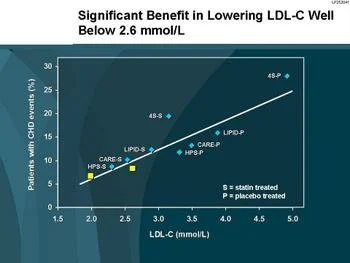Cholesterol
It has been known for many decades that cholesterol levels are related to heart disease and treatment of cholesterol levels over the past three decades has been subject to extensive research. It is now well established the benefit that lowering cholesterol has reducing heart disease.
What Is Cholesterol?
The cholesterol in the body remains a complex biological system. Cholesterol is an essential part of bodily functions. We now have a much better understanding of cholesterol and measuring cholesterol sub-particles. In simple terms, the measured total cholesterol encompasses multiple sub-fractions including the bad cholesterol, (LDL), triglycerides and good cholesterol, (HDL). The LDL cholesterol is bad and should be as low as possible and the HDL cholesterol is good and should be as high as possible. Triglycerides should also be as low as possible and reflects the type of LDL cholesterol particles in the blood, with higher triglycerides reflecting worse LDL particle size.
How Low Should Our Cholesterol Be?
It is worth remembering that the majority of heart disease in Australia occurs in people with “statistically normal” cholesterol levels. I am often told by patients that their cholesterol is “normal”. Unfortunately, this normal is a statistical normal but still reflects excessive cholesterol in the blood. Similar to blood pressure, the target cholesterol levels that we aim for will vary depending on the individual patient’s risks. Also, the target cholesterol levels have changed over the past two or three decades as further research studies have been performed. Having said that, it is now generally accepted that if you plot a graph of cholesterol verses risk it is linear and does not appear to have a lower limit. In patients with established heart disease, there is no lower limit of cholesterol that we should strive for. In other words, the lower the cholesterol the better. At the end of the day, the normal cholesterol for Primates is about 1, and we are after all primates!
What Is The Evidence For Cholesterol Lowering?
Several decades ago it was apparent that cholesterol was related to heart disease. Of course, even at that stage we did not know whether lowering the cholesterol from base line levels indeed led to a reduction in heart disease. In view of this, over the past two to three decades multiple studies have been performed, initially with quite high cholesterols, but more recently with cholesterols averaging 4.5 mmol/L. These studies have been done with modern medications and always compared to a placebo. Throughout all these studies there has been consistent reduction in all forms of heart disease when the cholesterol is lowered with modern medications. It is from these studies that we now believe that the lower the cholesterol the better, and although still very debatable, there is an argument for putting cholesterol lowering medications in the water.
How Do You Treat Cholesterol?
Cholesterol can be managed both with life style changes and medications. Every individual varies with regards to their response to life style measures. These should include regular exercise, weight reduction and diet. However, whilst these measures are extremely important in their own right, there are individuals in whom these measures have very little impact in their total or LDL cholesterols. However, they usually do have enormous benefits with regards to increasing the HDL, (good cholesterol).
Medications remain the mainstay of treating high cholesterol. Fortunately these days we are well equipped with very safe and very well tolerated medications to treat high cholesterol which have been shown unequivocally, in multiple research studies, to significantly reduce the incidence of heart disease.

